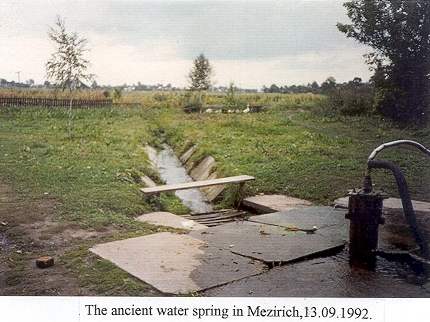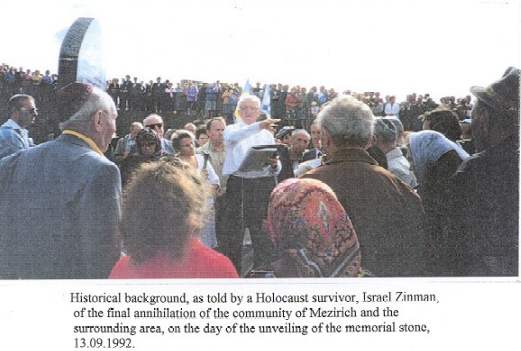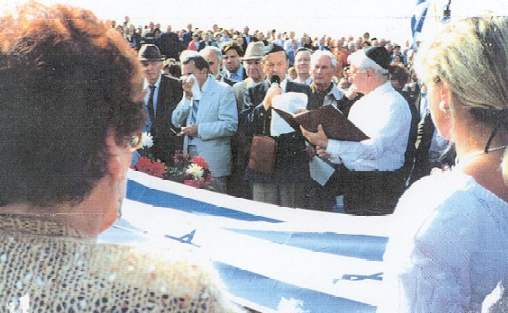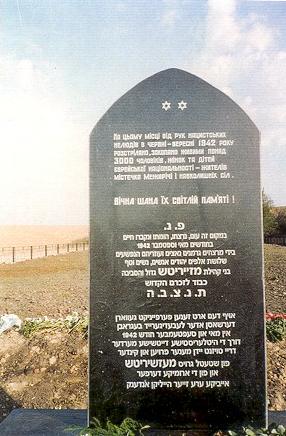Previous Page
|
Next Page
The Annihilation
The year 1942, the 22nd of May, Tuesday, three days before Shavuot, the order
was issued that 200 Jews should gather at the school yard with shovels to
go to
Nevirkov to do work for three days.
A secret fear pervaded the town. Intuition foretold a terrifying message.
People were afraid to go out to work and they started to hide. A few brave ones
stated that they would go as ordered - one had to work anyhow and they were
promised food. So what difference would it make where they worked? But they
really had no choice. Those who did not go willingly were forced out of their
homes. Whoever was found in the streets was seized and ordered to bring along
shovels.
One horrible incident occurred when they seized a young woman who was nursing
her child. Her mother pleaded with them to take her instead, so they took them
both. They drove them all the Jews of Meziritch, with their shovels, like a
herd of cattle to the town's brickyard.
At the same time there were about one hundred Jews, men and women working in
the military barracks at Nevirkov. I was among them together with my sister
Dvorah, my young cousin Dunia, Chana Shternshes, Faiga Gurvitz, Dina Klurfine,
Michla Burshtein, Moishe Shreiber, Itzik Glazer, Nuneh Coopershmidt, Chasia
Freedman and the rest of the blessed names written before our eyes in the list
of the holy ones.
On the same day, Tuesday, May 22, 1942, at three o'clock, I was sent by the
Germans to a place where they gathered all the grain, potatoes, cabbage stalks
and straw from the Meziritch district which they called the grain centre at the
Nevirkov Barracks.
My orders were to go quickly with their driver to Meziritch and bring them two
gold rings which they had ordered from Rotenberg on New City Street and a few
bars of scented soap from the druggist Chana Yusseim (Flumenbaum) in exchange
for a little wheat for each of them, and return immediately to the Barracks.
As I was riding with the driver, a few hundred metres from this holy site where
we are now standing, the police stopped us and pulled me from the wagon. As I
showed them the order from the Nevirkov German Barracks to go to Meziritch and
return immediately back to work, I heard from the people standing around there
"Zhidi kupayut Yami ubyut ich" meaning "the Jews are digging
holes and they will all be killed". I continued on the Diven Road. Then I
saw as we passed the brickyard, a mass of people with shovels in their hands
digging ditches. A horrifying fear seized me. Coming to Meziritch near the
building across
from Stetzki's palace, I met Jewish mothers who asked me "Srulik, where
are our children?" I cried out to them "Jews rescue yourselves, they
are digging ditches!"
I managed to get the items the Germans wanted, and went into my home and kissed
my mother and two little brothers and ran quickly to Nevirkov by another road
in order to warn the workers not to go home by way of the brickyard. But it was
too late. All the workers had gone back on the same road they always took till
this deadly tragedy and were detained by the ditches. Here in this spot where
we now stand, our dear ones dug three large trenches 19 meters long and 9
meters wide; how deep I don't know.
They placed a wagon with black bread for them to see but they didn't get to eat
it.
On Friday, May 25, 1942, Shavuot, 4 o'clock in the morning, 500 S.S. Nazis with
black uniforms "Death Squad" together with their assistants,
surrounded the Jewish homes in Meziritch and with mad beastly shrieks screamed
"Jews come out to die".
More than a thousand Jews - our beautiful beloved mothers, our little brother's
and little sisters, our devoted fathers, our dear grandfathers, grandmothers,
uncles and aunts were forced to go to the concentration place in Meziritch on
the playground near the school. From there they were driven like sheep to the
slaughter.
In rows of four with small children in their arms, Chaim Hersh Shternshes
staggered as he walked as though he would fall. Shneur the teacher, covered
with his "talis" was so weak that he couldn't keep up. He was shot
and thrown into a ditch in the brickyard near Sholem Lesak.
At the end of the procession, accompanied by music, Gestapo on motorcycles,
calling out from time to time to "Death to all Jews".
The first "execution action" took from 10:00 to 12:00 pm, and you Jews
will stay in the ground". He then yelled "Fire" and then ten in
a row were thrown into the ditch and machine gunned. Ten more were thrown in on
top of them and so on, until they filled the three ditches - in one ditch,
women and girls; in the second, men and boys; in the third, little children.
Some of the little ones were smeared under the nostrils to drug them while
others were speared and thrown in.
A twin, children of Abraham Nissenholtz were sitting on a little blanket
playing. A German S.S. man called out that whoever would throw these two
children into the hole, would get
their blanket as a reward. From those who were standing around and watching
there was one woman who carried out this devilish deed and received her reward.
Rachel, the midwife Smoleh, and Esther Rubinstein, the dentist were told they
would be spared it they promised to teach the town people their professions,
but their children would die. They refused and were killed with all the others.
Years later, when the earth settled, you could see the bodies of Rachel the
midwife holding her two little girls and one had a little comb in her hair.
They also took new mothers with their newborn babies and threw them in. Among
these was Rachel Kamenshein.
At twelve noon, the S.S. Commander ordered "Finished, no more
shooting" and he congratulated the twelve remaining Jews among whom were
Michla Burshtein (writer) and Golda Esther, of blessed memory, Sossel Shwartz
and others. The trenches were quickly covered with quick lime and on top of
that, earth. A few days later we could see the earth over these graves had
heaved and was disturbed, until the half-dead victims had breathed their last
holy breath.
The unfortunate remaining Jews were ordered to register at the police station
and work diligently. Their first job was to sort the clothes that had belonged
to the dead. From the twelve who were spared, two of them, Golda Uster and
Michla Burshtein (writer), after much wandering and hardships, eventually got
to Israel.
A few days after the "action" that is the execution, those who had
hidden and were spared came out of hiding and were ordered into a ghetto on two
streets - the street of the butcher shops and where the synagogues stood.
Although there were about 950 Jews still alive, the Germans said they would
live and they carried out all they demanded of them.
On our way to work at Nevirkov, we passed the three large graves of relatives
with their dried blood on the cracked soil. We fell upon them, kissed the earth
and wept. The men said kaddish and we continued to our daily work at the
Nevirkov Barracks to sort the grains. One morning on our way to work, we saw a
freshly dug ditch. They had caught 20 Jews of Matayevka and shot them in the
pit.
We walked around our ghetto like living corpses. Some Jews from Litchen came to
us and told us their ghetto had been surrounded. We heard the same of other
cities and towns. People were running from ghetto to ghetto like madmen looking
for a way to save themselves but not knowing how or in what way.
This happened before the High Holidays of that year, 1942, September 23. The
second slaughter; "Action" it was called. I will never forget the
last prayer of Yom Kippur in the home of Shaul Shteindel. Some prayed in the
home of Leah Himberg. There the Jewish Committee and the Jewish police were
stationed. I was standing with my revered father, with a few more Jews from the
Lucas, the Kramers, the Lagers and we wept as we prayed begging God for mercy.
But the gates of mercy did not open for us. Suddenly there appeared the mayor
of the city with his secretary and said: "Stupid people, why are you
praying to God? - the decision is to shoot all of you".
A panic seized the ghetto. People started to run - some into the woods, some to
Christian friends, and some just ran. We were like crazy. Husbands lost their
wives and wives their husbands. A few Christians told us to run anywhere we
could because the Germans had surrounded the ghetto and closed the roads out of
Meziritch. And this is how they caught runaways and brought them to the fourth
open grave - here where we have erected this monument - shoot and bury them.
The decision was "Judenrein" kill them till there were none left.
This happened on the first day of Succot, September 23, 1942 was the date of
the second execution "Action" of those Meziritch Jews who were left
after the first 'Action" had taken place on the first day of Shavuot.
That was the end of the beautiful Jewish world of larger Meziritch.
All these holy ones will ever be engraved in our hearts. Amen
With great sorrow and longing, we cover our brothers' graves with fresh flowers
and the Israeli flag.
We will remember them forever and will never forget. Amen
Israel Zinman, 13 September, 1992.
BALLAD OF THE BROTHERS GRAVE REDEEMED FROM OUR DESERTION
By a daughter of Meziritsch -- Dina, from the house of Pressman
Meziritsch was laid to waste, the entire community
destroyed,
Her Jews slaughtered during two massacres,
Both during the pilgrimage periods of the same year,
One during Shavuot and one during Succot.
... And the spring trickles forth, next to the old flour mill...
Survivors scattered everywhere,
Most of them in Israel, a few of them throughout the world,
Only our brothers' grave stays in the Vale of Tears,
And standing in place of our desertion, cows and their shepherds,
... And the spring trickles forth, next to the old flour mill...
Because the country was ruled by a government of evil,
And while its disgrace was revealed before it was anticipated,
One still hid crime upon crime, from the another,
Until the day came and the voice sounded the alarm:
Rise and do a deed because a generation is going to be exterminated!
...And the spring trickles forth.
next to the old flour mill...
And they worked, until they erected a tombstone for the innocent and the direct,
Until a monument was erected for the pious and the righteous,
And it was heard, each man saying to the other in their grave:
I knew it, one of these days they would come!
... And the spring trickles forth, next to the old flour mill...

THE LAST YOM KIPPUR IN GREATER MEZIRICH
Esther Zinman
The Eve of Yom Kippur in the Ghetto of Mezirich. The pitiful remainder of the
Jews, who remained after the first "action", stand half-dead, the
light in their eyes shut off, in line to receive 200 gr. of bread hard as a
rock its baking incomplete.
As it says in the Scriptures, "to eat bread before the Fast". Whoever
still had clothing left, was lucky and could exchange it at the Gentiles
for a bottle of milk or flour or chicken. These people, their meal before the
Fast was rich. Most of the Jews had nothing to exchange, and they made do with
the bread which was like cement. For drink, they had something which resembled
tea,, sweetened by beets instead of sugar.
The site of the prayer was set at the Shteindel house, for several reasons:
First of all, their house stood downhill close to the stream, and there was no
passage near it. Secondly, in the house were large rooms and less people.
Also, this family had more rights. They had a leather workshop,, in which
leather was tanned for the Nazi Army and the Ukrainian Police. They worked
there themselves and also employed several other Jews. When the sun went down,
a small number of Jews gathered for the "Kol Nidrei" Prayer. Every
man and his broken heart. There was not one family that was complete.
Everyone was as silent as the dead. Their faces were yellow, wrinkled, thin,
the eyes sad. There was no mirror, but looking at one another, one could see
oneself. The window was shut and blocked, so that light would not be seen.
Someone read from the Prayer Book and everyone listened. Everyone was silent.
Only the hearts beat. Tears stained with blood streamed from the faces,
remembering the fate of the innocent people sacrificed, and their fate in life.
What is awaiting us? Our hearts and eyes were turned to G-d in Heaven, that he
should listen to our prayers, to our longings, from deep down in our hearts,
which could shake rocks.
We were shaking with fear, in case the police would discover the Jews gathered
together for prayer to their G-d. Our big sin passed unnoticed. We blessed each
other with a happy New Year, and each one left for his home. Several men stayed
up all night to say "Tehillim" prayers.
The next morning, most of the Jews were taken to work. Those who stayed home,
gathered together for more silent prayers. At approximately I I A.M.. there was
a slight noise coming from the outside. We looked at one another and then
outside. What happened?
Unexpected guests came from the next town of Tuchin. They were bewildered,
their faces pale as death, and their hearts shaking, as they told us that the
Gestapo and the Ukrainians encircled the ghetto in their town. The Jews there
did not give in, they fought, and finally, they burned their homes. The Tuchin
Ghetto is burning! They cut the barbed wire fence and escaped, some to the
forest, some to the fields, and some to the river, to drown themselves. And
some escaped to us, to Mezirich. Perhaps the tragedy will not reach us and they
shall be saved together with us. We were heartsick. It was hard to continue in
prayer, but still we went back into the house. Our tears disappeared - dried up
instantly. Our hearts hardened like stone. In silence we stared at one another.
We do not know what to do, what to think.
After the closing prayer, we again blessed each other with a happy New Year,
that a miracle will happen, and that we shall remain alive. And so we
dispersed. The miracle did not happen. Yom Kippur, then in October, 1942, was
on a Monday. On Tuesday, we again arose, as usual, and went to work. Thus on
Wednesday. In the meantime, it is quiet. On Thursday morning, we again. went to
work. We felt a change. The Gestapo men, in their black uniforms and swastikas
on their left arm, are parading on the outskirts of the town. A bit later, the
town was filled with the usual Ukrainian Policemen and others from neighboring
towns.
On Friday morning, the Ghetto in Mezirich was encircled. That was the last
"action" on the remainder of the Jews. That was the end of the
Mezirich Jews.
The Eve of Succot, October, 1942.
Previous Page
|
Next Page
This material is made available by JewishGen, Inc.
and the Yizkor Book Project for the purpose of
fulfilling our
mission of disseminating information about the Holocaust and
destroyed Jewish communities.
This material may not be copied,
sold or bartered without JewishGen, Inc.'s permission. Rights may be
reserved by the copyright holder.
JewishGen, Inc. makes no representations regarding the accuracy of
the translation. The reader may wish to refer to the original material
for verification.
JewishGen is not responsible for inaccuracies or omissions in the original work and cannot rewrite or edit the text to correct inaccuracies and/or omissions.
Our mission is to produce a translation of the original work and we cannot verify the accuracy of statements or alter facts cited.
 Mezirich, Ukraine
Mezirich, Ukraine
 Yizkor Book Project
Yizkor Book Project
 JewishGen Home Page
JewishGen Home Page
Yizkor Book Director, Lance Ackerfeld
This web page created by Lance Ackerfeld
Copyright © 1999-2026 by JewishGen, Inc.
Updated 6 July 2002 by LA






 Mezirich, Ukraine
Mezirich, Ukraine
 Yizkor Book Project
Yizkor Book Project
 JewishGen Home Page
JewishGen Home Page